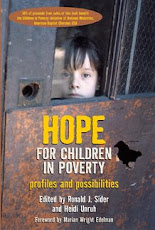In August, the U.S. Census Bureau released new data on poverty and family income for 2007 (download the Census Bureau pdf report; see a Center on Budget and Policy Priorities analysis by Hope for Children in Poverty authors Arloc Sherman and Sharon Parrott).
Here's the good news: the number of uninsured children dropped (largely because of SCHIP, the State Children’s Health Insurance Program), the overall poverty rate remained steady, and overall median income actually saw a modest rise.
Here's the bad news: most of the economic gains were concentrated in higher-income households. The child poverty rate rose to 18%. An additional 500,000 children fell into poverty in 2007. And the number of Americans in “deep poverty” also rose. About 15.6 million Americans lived below half of the poverty line in 2007. This means for a family of three, the household lived on about $8,300.
Here's more bad news: with the bottom falling out of the global market, things are likely to get a whole lot worse for children and their families, here and abroad.
The issue of lifting people in poverty gets little enough attention in the normal course of political affairs. It becomes invisible in times of crisis. (Did you hear a single question about poverty in any of the last three campaign debates?) If we allow half a million children to sink into poverty in a year when average incomes rise, what will happen to children in a time of significant economic downturn? If our nation neglects its own children, how much less a priority are the millions of desperate children around the world?
How can we ensure that we don't let the cries of poor children go unanswered in the mist of much clamor about markets, bankruptcies and bailouts? How can we encourage policymakers to weigh the impact of their initiatives not only on Main Street, but also on the meanest streets where children live?
One way is to participate in Sojourner's Vote Out Poverty Campaign.
"While most elected officials say they want to reduce poverty, few have provided leadership on the issue. Why? Most Americans are disengaged from the lives of the poor and the political process, so poverty reduction is pushed to the bottom of the priority list. Meanwhile, 30,000 children die every day of preventable causes around the world and millions go to bed hungry. These statistics are unacceptable to Christians if we profess to follow the teachings of Christ. To change them, we must engage in personal service, community transformation, and political advocacy."
The goal of the campaign is "to mobilize a faith-based constituency of churches and individuals capable of putting poverty at the top of the political agenda," pushing for a concrete plan and signed pledge from political leaders to (1) reduce poverty in the U.S. by 50% over the next decade, and (2) achieve the Millennium Development Goals (a set of international goals for reducing global poverty).
Perhaps this general economic insecurity gives us a new opportunity to highlight the needs of poor children. When poverty becomes a destination that more people are at risk of visiting, we have an added collective incentive to wipe it off the map.
What are your ideas for placing children on the horizon of national policies? What questions in relation to children in poverty should our current and potential political leaders be addressing as they search for the best way out of this mess?
Saturday, October 11, 2008
Subscribe to:
Post Comments (Atom)

No comments:
Post a Comment